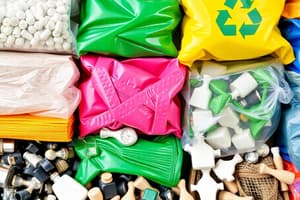Podcast
Questions and Answers
Which types of plastics are commonly recycled?
Which types of plastics are commonly recycled?
- ABS (7) and SEBS (8)
- PET (1) and HDPE (2) (correct)
- LDPE (4) and PP (5)
- PVC (3) and PS (6)
What should be done to metals before recycling?
What should be done to metals before recycling?
- Rinse containers to remove residues (correct)
- Leave labels on to identify contents
- Paint them for better presentation
- Crush them to save space
Which practice does NOT help reduce waste?
Which practice does NOT help reduce waste?
- Planning meals
- Buying in bulk excessively (correct)
- Using reusable products
- Composting organic waste
Which of the following is an upcycling project?
Which of the following is an upcycling project?
What is important to do when recycling glass?
What is important to do when recycling glass?
Flashcards are hidden until you start studying
Study Notes
Types Of Recyclable Materials
- Plastics
- Commonly recycled types include PET (1) and HDPE (2).
- Clean and dry before recycling.
- Paper
- Includes newspapers, magazines, and cardboard.
- Remove any plastic or metal parts.
- Metals
- Aluminum (e.g., cans) and steel are widely accepted.
- Rinse containers to remove residues.
- Glass
- Clear, green, and brown glass can be recycled.
- Rinse and remove labels if required.
- E-Waste
- Includes old electronics like phones and computers.
- Often requires special e-waste recycling programs.
Reducing Waste
- Practice Minimalism
- Buy only what is necessary to reduce excess.
- Choose Reusable Products
- Use cloth bags, stainless steel bottles, and glass containers.
- Plan Meals
- Reduce food waste by planning meals and using leftovers.
- Compost Organic Waste
- Compost fruit and vegetable scraps to enrich soil.
- Educate Yourself
- Stay informed on local recycling guidelines and proper disposal methods.
Upcycling Projects
- Furniture Transformation
- Refurbish old furniture with paint or new upholstery.
- Planters from Containers
- Use old jars, cans, or pallets to create unique planters.
- T-shirt Bags
- Convert old t-shirts into reusable shopping bags.
- Glass Jar Organizers
- Use glass jars to organize craft supplies or kitchen items.
- Artwork from Recyclables
- Create art pieces from scrap materials, such as paper mache or collages.
Types Of Recyclable Materials
- Plastics: PET (1) and HDPE (2) are the most commonly recycled plastics; ensuring items are clean and dry before recycling is essential for processing.
- Paper: Includes newspapers, magazines, and cardboard; all plastic or metal components must be removed before recycling.
- Metals: Aluminum (e.g., beverage cans) and steel are widely accepted materials; it’s important to rinse containers to eliminate residues for recycling.
- Glass: Recyclable glass types include clear, green, and brown; rinsing and removing labels may be necessary to facilitate recycling.
- E-Waste: Encompasses old electronics such as phones and computers; often requires participation in special recycling programs due to hazardous components.
Reducing Waste
- Practice Minimalism: Emphasizes buying only necessary items to minimize excess and reduce disposables.
- Choose Reusable Products: Promotes the use of cloth bags, stainless steel bottles, and glass containers to decrease reliance on single-use items.
- Plan Meals: Helps in reducing food waste by effectively planning meals and making use of leftovers.
- Compost Organic Waste: Encourages composting of fruit and vegetable scraps, which enriches the soil and reduces landfill waste.
- Educate Yourself: Staying informed about local recycling guidelines and disposal methods is crucial for effective waste management.
Upcycling Projects
- Furniture Transformation: Involves refurbishing old furniture with new paint or upholstery, giving it a fresh look and extending its lifespan.
- Planters from Containers: Suggests utilizing old jars, cans, or wooden pallets to create unique and functional planters.
- T-shirt Bags: Encourages converting old t-shirts into reusable shopping bags, reducing plastic bag usage.
- Glass Jar Organizers: Advocates using glass jars for organizing craft supplies or kitchen items, promoting reuse over new purchases.
- Artwork from Recyclables: Inspires the creation of art from scrap materials, such as paper mache or collages, fostering creativity while reducing waste.
Studying That Suits You
Use AI to generate personalized quizzes and flashcards to suit your learning preferences.




